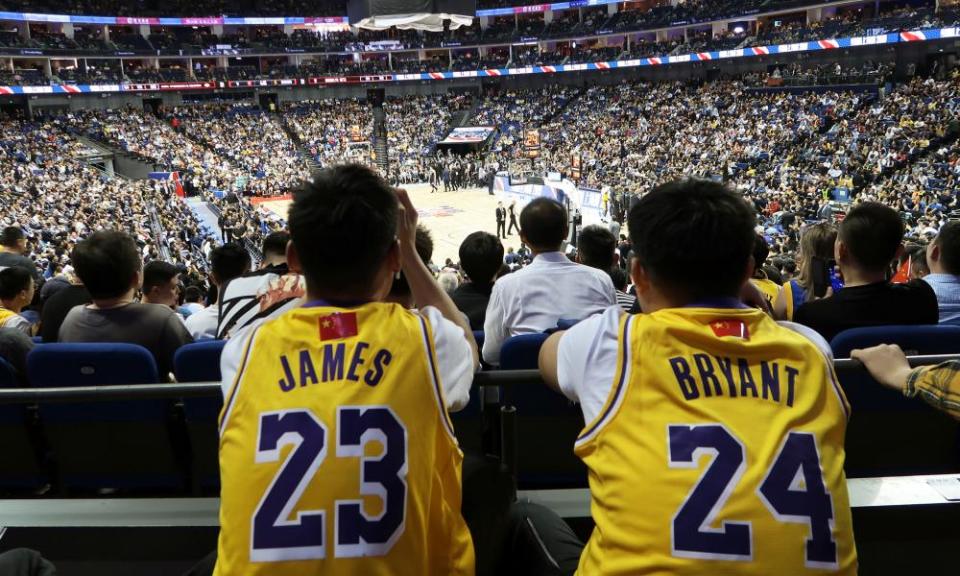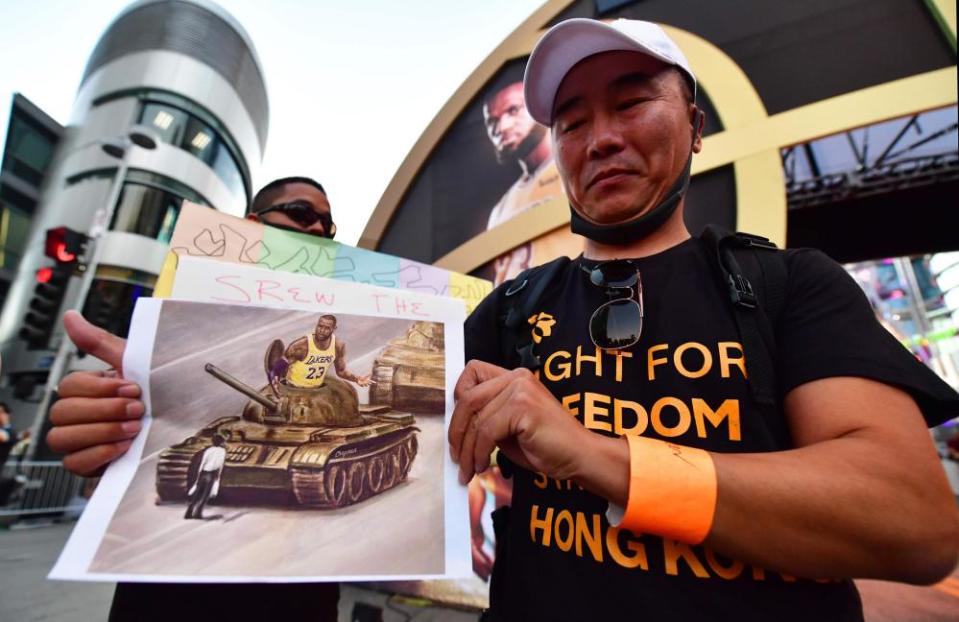'The losses are substantial': the NBA's trouble with China, four months on

For someone who was raised in Italy, came of age in Philadelphia, and ultimately established himself as a star in southern California, it is telling that Kobe Bryant once referred to China as his “home away from home.” Bryant first visited the country in 1998 to host a basketball camp, a year after he entered the NBA straight out of high school. The trips would become a fixture of Bryant’s offseason during his 20-year career. There he was, wowing fans with slam dunks on the Great Wall. And there he was, getting mobbed at airports in scenes reminiscent of Beatlemania. “I thought I was famous,” remarked LeBron James at the 2008 Beijing Olympics, “until I got here with Kobe.”
Bryant had the best-selling sports jersey in China for years, and by the time he retired in 2016, he was far and away the country’s most popular athlete. A reported 110 million people tuned in to Tencent, the NBA’s digital streaming partner in China, to watch Bryant’s last game for the Lakers. “It’s harder for me to walk around here than in the States,” Bryant said during a 2013 visit. “In the States, you get a lot of recognition. They say, ‘Hi.’ They want autographs and pictures. But here, it’s uncontrollable. They rush you and surround you to the point where you can’t go out.” Bryant’s shocking death last month prompted a similar mass outpouring on Weibo, essentially China’s version of Twitter, where he had posted a video message commemorating Chinese New Year to his nine million followers just two days before his helicopter crashed in Calabasas, California.
Bryant’s status in China serves as a powerful symbol of the NBA’s successful global outreach; his rise in popularity dovetailed with basketball’s own precipitous growth in the country. But the league that Bryant helped popularize there remains off the air on Chinese state television, the fallout from a months-long standoff over a top NBA executive’s expression of solidarity with the pro-democracy protesters in Hong Kong. As the NBA commences the second half of its season, and continues to mourn the untimely loss of a legend, there is a sense of hope that the league is close to repairing its relationship with China – even if there are questions over whether it will ever be the same.
Related: NBA’s travails in China a cautionary tale for the Premier League | Marina Hyde
There have indeed been signals in recent weeks of a potential thawing of tensions between the two sides. Cui Tiankai, China’s ambassador to the United States, offered a tribute to Bryant on Twitter last month, praising the Lakers great “for his contribution to the world of sport and to #ChinaUS people-to-people exchanges.” Chinese consul general Huang Ping offered gratitude earlier this month for the NBA’s $1.4m donation to Hubei province, where the coronavirus outbreak originated. At a press conference held during the league’s all-star festivities in Chicago, NBA commissioner Adam Silver said his sense is that the games will return to China Central Television (CCTV), Chinese state-run television, “at some point in the future.” The NBA has not been broadcast on CCTV since October, when Houston Rockets general manager Daryl Morey caused a furor by tweeting, and quickly deleting, a message urging his followers to “stand with Hong Kong.”
At the league’s midseason celebration in Chicago, Silver made it clear that the ball is in China’s court. Silver added that “there continues to be enormous interest for the NBA in China,” and that his “sense is that there will be a return to normalcy fairly soon.” The All-Star events in Chicago were distributed on Tencent, with which the NBA inked a five-year, $1.5bn deal last summer to continue as the league’s exclusive Chinese digital streaming partner. Despite the ongoing blackout on CCTV, Tencent resumed showing a few NBA games every night not long after the Morey dispute, and has continued to do so since. A recent survey of sports business executives found that more than 60% believe that the firestorm surrounding Morey’s tweet will have a “non-existent” or “minor” effect on the league’s business in China five years from now.

Others aren’t so sure. “The question is: what does normalcy mean?” said Victor Cha, a professor at Georgetown University who served as director for Asian affairs on the National Security Council from 2004-2007. “When Adam Silver talks about a return to normalcy, I assume he’s talking about NBA access to Chinese viewers and the Chinese market, but the real question is: is that the only way to measure normal? Is the new normal that there’s essentially a de facto muzzle on players saying anything related to political issues in China?”
“If tanks roll through Hong Kong,” Cha added, “are they just not going to say anything?”
Although Silver rebuffed China’s purported demands to sack Morey, the NBA and its players were not exactly hailed as profiles in courage in the wake of the controversy. A spokesperson for the NBA responded initially by saying that the league recognized the “views expressed by Houston Rockets General Manager Daryl Morey have deeply offended many of our friends and fans in China, which is regrettable.” LeBron James, who has personified the league’s embrace of political activism perhaps more than any other player, said Morey was “misinformed” on the matter. Lawmakers in Washington chastised the league for that response. Republican senator Ted Cruz, who represents Texas, commended Morey for calling out “the Chinese Communist Party’s repressive treatment of protestors in Hong Kong,” and pilloried the NBA for “shamefully retreating” out of financial concerns.
The fiscal implications have loomed large over this saga. Speaking in Chicago this month, Silver said he expected the NBA to lose “hundreds of millions of dollars” over the standoff with China due to the TV blackout and the severed business relationships that resulted from the dispute. That, he noted, was much less than some of the doomsday forecasts that projected the controversy to cost the league billions.
“Certainly, probably less than $400m, maybe even less than that,” he said. “It’s substantial. I don’t want to run from that. We were taken off the air in China for a period of time, and it caused our many business partners in China to feel it was, therefore, inappropriate to have ongoing relationships with us.” But Silver once again stressed that he doesn’t “have any sense that there’s any permanent damage to our business there.” It’s a business relationship rooted in the NBA’s emergence as China’s most popular sports league, the fruits of the league’s decades-long push into the Asian market.
In 1992 under the late David Stern, Silver’s predecessor as commissioner, the NBA opened its first Asian office in Hong Kong. Stern, who served as commissioner from 1984 until 2014, is widely credited for exporting the league to China. In 1987, Stern went to Beijing with a demo tape in hand in the hopes of brokering a historic deal. There, he forged a relationship between the NBA and CCTV, offering the state broadcaster videotapes of league footage each week in exchange for advertising revenue. Stern often recalled trips to the country in the 1990s, when locals would ask about the “team of the red oxen,” better known in the English speaking world as the Chicago Bulls.
But the watershed moment came in 2002, when Yao Ming was drafted by the Rockets. In Yao, China could finally claim its own first bona fide star playing in its most beloved sporting league. Powered by ballots cast back home, Yao was twice the leader of NBA All-Star game fan voting. He was named an All-Star in each of his eight seasons for the Rockets, a career that coincided with the NBA staging more events in China. In 2004, the Rockets played a pair of preseason games in Shanghai and Beijing, marking the first time the NBA tipped off on Chinese soil in 25 years.
Since 2007, the NBA has held preseason games in China every year except one. About 800 million viewers in China watched the NBA last season, and modest estimates of the amount of revenue the league generates there are generally pegged at about $500m annually. NBA China, which launched in 2008 and handles the league’s business ventures in the country, is worth more than $4bn, according to Forbes.
The Rockets also loom large over all of this, of course. They are, by virtue of Yao’s connection, the NBA’s most popular team in China, bringing the league’s success story in conflict with the crisis over Morey’s tweet. Since then, Rockets games have been banned, forcing the team’s fans in China to resort to illicit web streams. Cha wonders if the team will return to CCTV or Tencent even when the rest of the league is back on Chinese airwaves. He pointed to the frayed relationship between China and Norway, which stemmed from the late human rights activist Liu Xiaobo winning the Nobel Peace Prize in 2010, as a potentially useful precedent. Liu was incarcerated in a Chinese prison at the time, and the price was placed on an empty chair during the ceremony in Oslo. In the years that followed, Norway’s salmon exports to China plunged.
“I’d imagine the longer this goes on, the more unhappy the people are going to be. Basketball is extremely popular in China. The Rockets are a very popular team,” Cha said. “You can substitute Norwegian salmon. There is really no substitute for the NBA.”

 Yahoo Sport
Yahoo Sport 





































